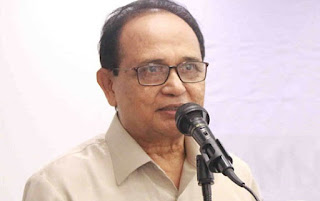Muhammad Zahidul Islam
The government had promised to disitalise all of its services to ensure e-governance by 2014 and Finance Minister AMA Muhith also reiterated it on several occasions in the past in his budget speeches.
“We want to establish e-governance by 2014,” Muhith said in his budget speech for 2009-10 when the Awami League-led alliance swept to power nine years ago.
Some progress is visible. But the government has not been able to live up to its promise in establishing e-governance, said researchers and digital business entrepreneurs.
In the country's digital journey, the government has initiated e-tendering and electronic government procurement but failed to automate value-added tax and income tax filing system, said Ahsan H Mansur, executive director of the Policy Research Institute of Bangladesh.
“Still, we are in the initial stage of adopting digital systems for the financial sector. Initiatives have been taken but they lack proper political concentration.”
According to Mansur, the government has updated some of its business processes but still there is huge gap between the expectation and the reality.
HIGH ON PROMISE LOW ON DELIVERY
“The government made very high promises but very few of them have been achieved, especially when it comes to e-governance.”
The former economist of the International Monetary Fund said he would give the government only 30 marks out of 100 for its efforts for digital transformation.
He, however, praised the private sector for successfully introducing mobile financial services and ride-hailing services.
Expectations about digital transformation are particularly high because there are about 8.60 crore active internet connections as of April, according to the Bangladesh Telecommunication Regulatory Commission.
But these users do not have many things to avail from the connectivity.
The ICT Division said the government has developed 200 e-services and more than 90 percent services will go live by 2021.
Officials said the Access to Information (a2i) programme of the Prime Minister's Office has started training all the government officials on the digital system.
The government has started e-filing systems and introduced digital signature, which has all the potential to boost transparency; but very few ministries have adopted it.
Private firms are successfully providing e-ticketing services but Bangladesh Railway has not achieved that much success in the field.
SCATTERED ATTEMPT
The government has done a lot for digitalisation but most of the work was carried out in a scattered manner, said Mahboob Zaman, managing director of DataSoft Systems Ltd.
For example, the government has implemented some projects in partnership with major international companies, which failed to rope in local partners.
As a result, there was no one to look after the projects when the foreign partners left after completing the projects, said Zaman, also a former president of the Bangladesh Association of Software and Information Services (BASIS).
He advised the government follow “build, operate and transfer” model to reap more benefit from the digital projects.
Zaman cited the setting up of about 5,000 digital union centres as one of the major successes of the government.
DataSoft developed automation systems for the customs department and handed it over to the authorities concerned after running it for five years.
In his budget speech in 2009-10, Muhith had said the government will increase incentives for software industries and promote the use of indigenous software in government and private sectors.
But, the government is still not procuring any local software, said Shameem Ahsan, also a former president of BASIS.
“If local companies had the chance to run government projects, I can guarantee you that incidents like the Bangladesh Bank heist would not have taken place,” said Ahsan, referring to the BB reserve heist in 2016.
LOCAL CO’s NOT ALLOWED
He said many local companies are doing well abroad but they are not allowed to bid for government projects because of stringent conditions, Ahsan said.
DataSoft is now establishing 10,000 smart homes in Tokyo using Internet of Things (IoT) solutions, what can be termed a spectacular leap for Bangladesh's IT industry.
The company is also developing IoT solutions to manage the toll collection for a bridge in the Democratic Republic of Congo.
The young government officials welcome the latest software and ICT services willingly, said Rashad Kabir, managing director of Dream71, which is working in nine countries.
“But the main objections come from the mid- and high-level management, who struggle to understand and use the new software and ICT services.”
Industry insiders said the government has developed 500 mobile applications but most of them are not functional and sometimes they contain backdated information.
The government websites are not updated regularly and people cannot access most of the digital services. They even fail to lodge complaints.
Telecom and ICT Minister Mustafa Jabbar said the government is now at the take-off stage on ensuring e-governance and will fly very shortly.
“It is true that we may have failed to deliver the services to the end-users but we have learned how the services can be delivered. Mindset is also a problem and we are now working on it.”
The minister said the government has rolled out the E-Government Master Plan, under which another 700 services will be digitalised with the help of the a2i programme within a short time.
- Courtesy: The Daily Star/ June 03, 2018












